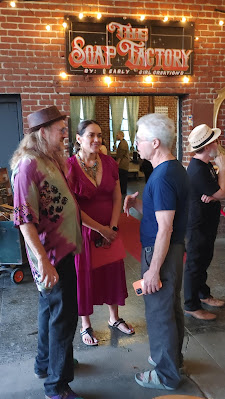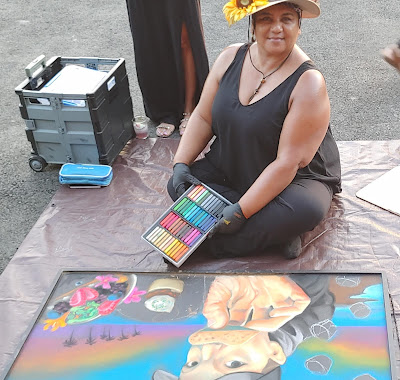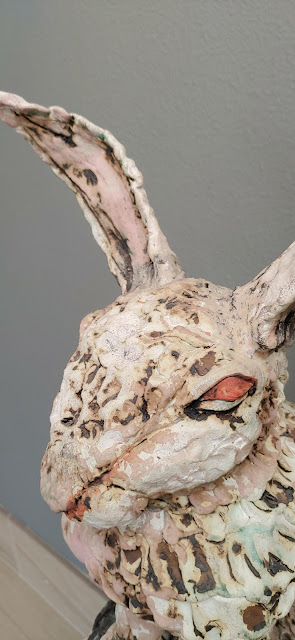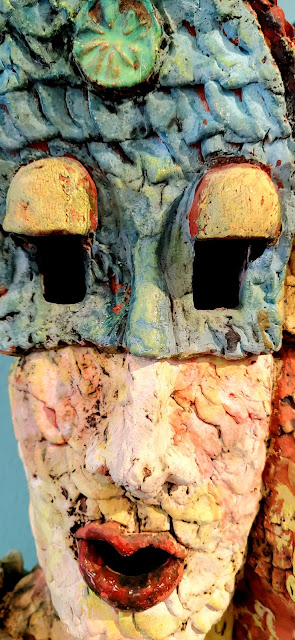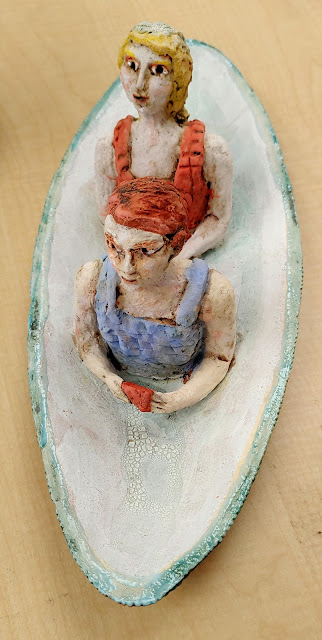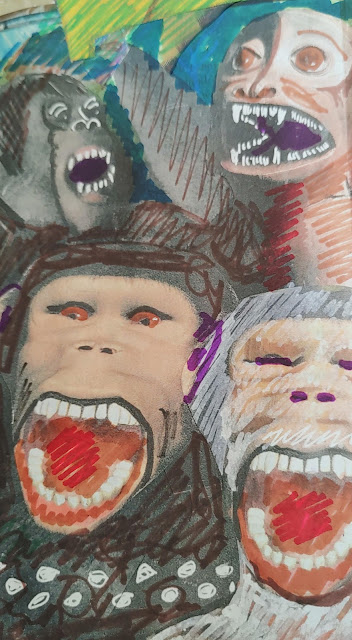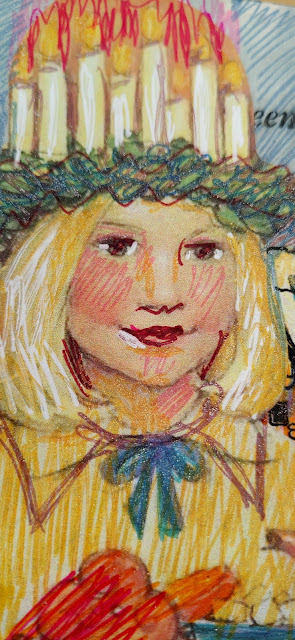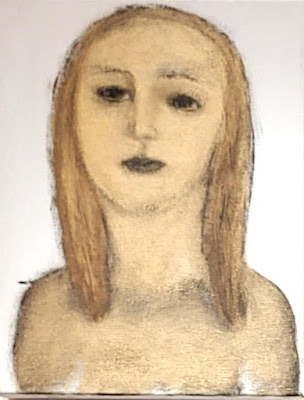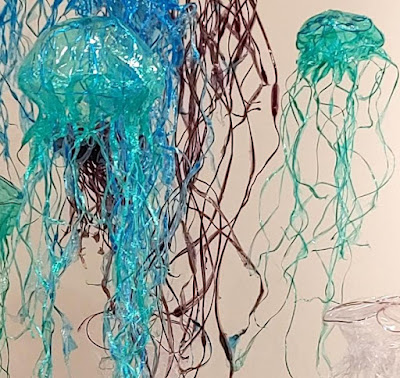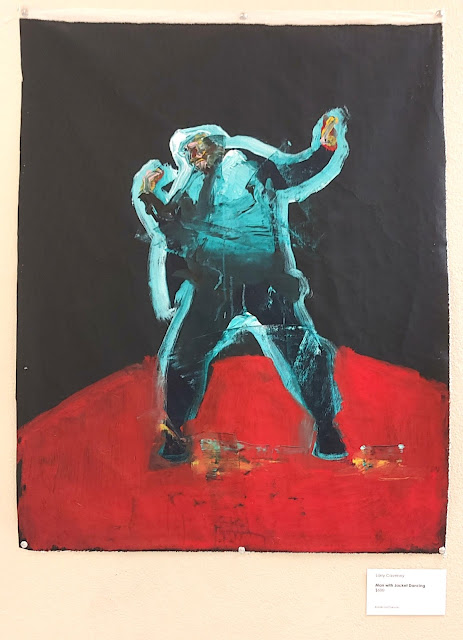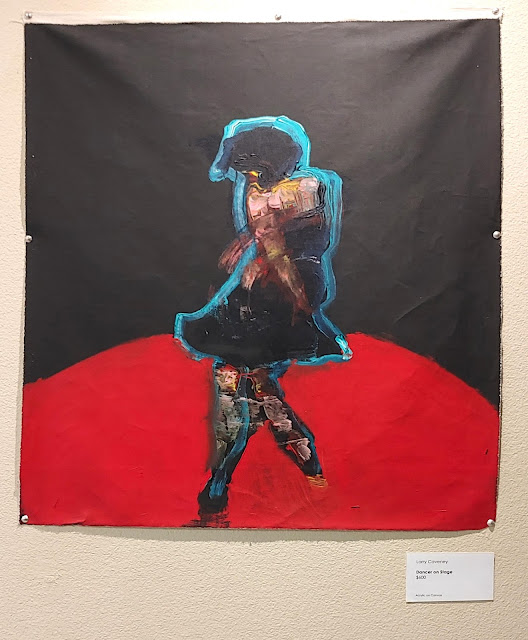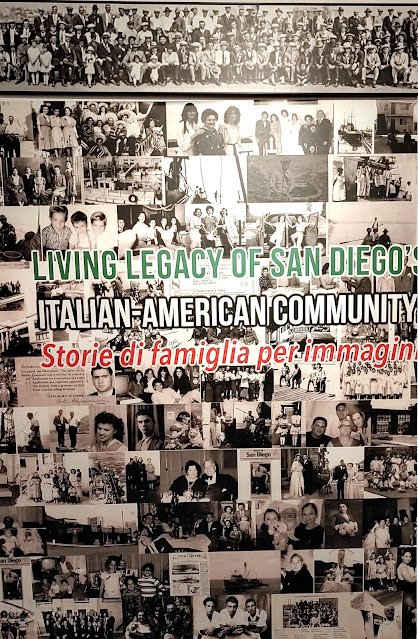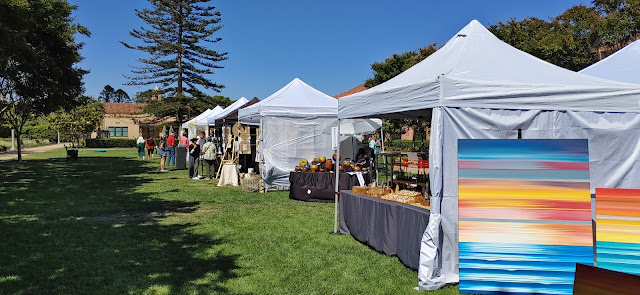By Vallo Riberto
With an art career spanning nearly sixty years, James Aitchison is an artist’s artist, While honing his craft to a fine degree, he continues to produce engaging, meaningful works of art. His current exhibition, titled, Superimpositions is a deep-dive-journey into the gritty, poem-scape, “they, all of them, know”, by the late writer/poet, Charles Bukowski. Noteworthy are the few, small-scaled, abstract paintings based on a poem by T S Elliot, Along with three small portraits, hung side by side on a hallway wall, but could easily have been displayed center stage. One of portraits, with a red, sold sticker, was titled, Arne, with two companion pieces of the late writer, Jim Harrison.
This review concentrates primarily
on the compositions that reference Bukowski’s poem. The paintings are an
intimate, narrative group of mostly, 14 x 17inch, mixed-media works on paper,
all beautifully installed in the charming Santa Isabel Gallery, located out on
highway 67, where 67 intersects with 78, and just seven miles before entering
the historic town of Julian, California.
The scenic ride is well worth the
trip from most points around San Diego
county.
Bukowski’s long, repetitive, stream-of-conscious, mantra-like stanzas, invite or instruct the reader to ask and inquire of the poem’s vast variety of personae… “ask the sunlight on the sleeping dog… ask the barber..,ask the man who drank with Dylan Thomas.., ask the one-eyed man.., ask, ask, ask and they’ll all tell you”..,Only after many lines of asking, do the final lines of the poem reveal the subject of the inquiry.
 |
| ask the sidewalk painters of Paris |
Superimpositions is Aitchison’s own gritty,
poetic, visual narrative culled from, and conflated onto Bukowski’s poem, this
title is both a response to, and a cerebration of Bukowski’s poetry. The first line of the poem, and the title of
a painting in the exhibition, ask the sidewalk painters of Paris a work from 2005, references Bukowski’s stay in France. Aitchison portrays Bukowski in a blue and
white, striped shirt, the type of shirt he’s often seen wearing in news, media
photographs. The poet is waist deep in blue water, with the prow of a small,
toy sail boat entering the frame just at the his back, both the water and toy
boat are references to the Luxembourg Gardens.
The poet’s left hand is extended above the water, and held between his
thumb and forefingers, a corkscrew. His right arm disappears just below the
elbow into a large white glove or mitt, holding the poet’s open bottle of
wine. The poem’s title is inscribed on
the side of the mitt’s white surface, (which could easily be taken as a metaphor
for the poet’s white writing paper,) and just below the title we can also read
the first line of the poem, “ask the sidewalk painters of Paris.” This
title serves as one of the prompts for the painting’s content. In the upper left corner, standing at his
easel, we see the sidewalk painter easily identified by the image of the Eiffel
Tower on his canvas. Positioned near the
bottom edge of the composition, rests a bird
helplessly caught up in the jaws of a large cat a reference to another
Bukowski poem. In the upper right
quadrant we view a hostile, nude, female figure, displaying a very menacing,
rude gesture. That figure along with the
first line of the poem, taken all together, is an encapsulation of the entire
poem, the Alpha and Omega that ties this series all together.
Another work from 2002, greets
visitors as they enter the front door, an homage to the artist’s friend and
mentor, the late painter, Harry Steinberg, titled, ask the bluebird
who comes at night, This painting is also on the announcement
mailer for the exhibition, and it displays a very powerful portrait of
Steinberg behind a canvas, with both hands cupped, extended above his head,
toward the suspended bluebird in flight. in a gesture of protection, or perhaps
release,
Other strong offerings in this
series are: ask the sunlight on a sleeping dog.., Ask me.., and, ask the man who drank with Dylan Thomas.
These paintings are infused with
the same rich symbolism found in all of this series. In Ask me, Mr.Aitchison places the
viewer in an attic studio, half of which is painted in drab, earth colors,
browns and grey tones. The room is not
strongly illuminated, but a single, incandescent light bulb, hangs over a very
old, oversized, black typewriter with a broken ribbon. The typewriter a once
prized, indispensable utility now looms oppressively, filling the partitioned
room from wall to wall. The writer is pressed against the scumbled, brownish
wall with his face covered with both arms, clad only in his boxer shorts, a dingy,
sleeveless, "wife-beater" undershirt and dirty socks. This figure seems to
be lamenting his impoverished situation and as such, is in a horrible state of
depression, crushed and defeated. A
large, kafkaesque, bug-like creature with large antennae, mockingly startles a
long, pale plane at the top of the typewriter, while a large, feral, orange cat
sits atop the partitioned wall, adding to the dismal condition of the scene.
I don’t feel that Aitchison has
romanticized this scenario, rather he has portrayed an accurate depiction of
those times Bukowski struggled to keep up and have ends meet.
The scene is made all the more
ironic by the juxtaposition to the writers oppressive space by a painter, drawn
in a spritely, fluid, contour line, seen through a partially, open door,
painting at his easel, in a clean white space, brightly illuminated by a
generous skylight overhead, blithely unconcerned with the tragedy unfolding
just inches away. Was this an actual
experience Aitchison may have lived through, anguish and emotional hardship,
and then the joyous state of being so engrossed in the creative act, as to be
oblivious to the world around him?
 |
| ask the sunlight on the sleeping dog, |
In the work titled, ask the
sunlight on the sleeping dog, a
dense, golden, vertical, column of sunlight falls directly down onto a large
sleeping dog while the poet, wrapped in a dark blanket, rests in a low slung
chair next to the dog. The shaft of light illuminates just the tip of his shoe The entire composition is drawn in ink line
contours with the exception of the brushed shaft of light, and the poets face
and hair, done in a loose, transparent application of earth toned colors. The
dog and poet occupy the Immediate foreground plane, and behind the figures, and
extending across the composition from left to right, a classic, decretive iron
fence. Beyond the fence, an ink line contour of rolling hills with one, lone,
hut-like structure off in the distance, creating a depth of field and an
airy, atmospheric perspective.
All of the paintings in this show
are, for the most part, composed with simple line and loose, transparent,
brushwork. Nothing appears forced.
Like so many artists of his generation, James Aitchison was weaned at the tit of abstract expressionism, spending a good many years finding his own voice and mark making process. These small paintings on paper speak volumes in the depth and breadth of their expressiveness. You come away from this work having had an engaging experience, all the more so if you’re at all familiar with Bukowski’s life and work. It may take a little time, with a bit of inspection, to gain access, and to ferret out the rich symbolism in each their given context, and to begin to realize that Aitchison is offering us a glimpse, not only into Bukowski’s life as a writer, but also a sense of how intimate this painter is with Bukowski’s thinking- superimposing his own depth of experience, melding two lives, two psyches, two layers of creative experience. Two very mature minds crafting their life in art.
 |
| Santa Isabel Art Gallery |
mixed media on paper
July 8 - Sept 3, 2023
Santa Isabel Art Gallery
30352 Hwy 78, Santa Isabel CA, 92070
760.765.1676
Gallery Director, Steve Clugston
Vallo Riberto is the
Alliance Studio Visit Program Chair, a support group of the Oceanside Art Museum. He is an Independent curator, Oceanside Museum of
Art, and the Bonita Museum of Art
and Culture, the Zone Contemporary Art Gallery, Osaka, Japan and is on the Exhibition
Advisory Committee, San Diego Public Library Gallery
valloriberto@gmail.com 619.603.2214




